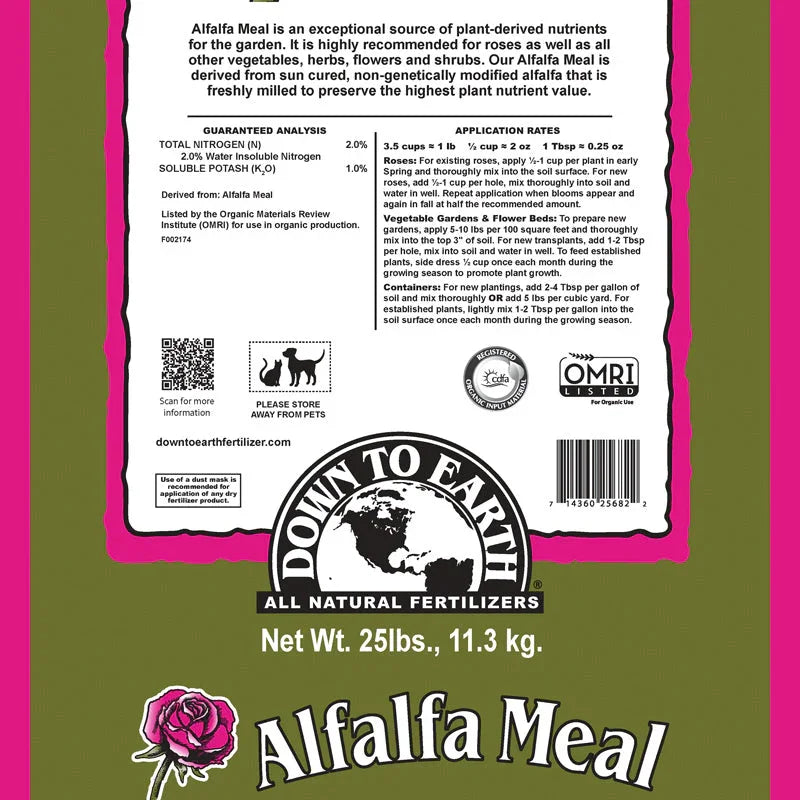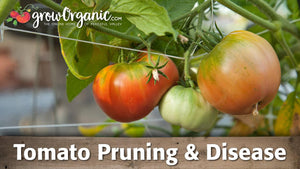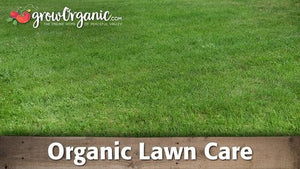Item Number: F033
Alfalfa Meal (40 lb Bag)
Feed Your Roses or Your Compost Pile
Alfalfa meal is made from the leguminous perennial alfalfa plant, commonly grown as a pasture and cover crop. Known for its pleasant aroma, its main advantage is boosting organic matter in the soil, though it also serves as an effective plant-based fertilizer. To see it in action, check out our Alfalfa Meal Product Video.
- Excellent addition to the compost pile for nitrogen content and absorbency.
- Roses respond especially well to alfalfa meal. For new plantings of roses, mix 0.5 cup per plant into the soil.
- For existing plants, mix 0.5-1 cup of alfalfa meal to a depth of 4"-6" around each rose bush.
- For vegetables and flower beds, work in at 2-5 lbs/100 sq ft.
- 2.5% N, 0.5% P, 2.5%K
It is derived from the leguminous perennial plant known as alfalfa (Medicago sativa), is a popular and versatile soil amendment used by gardeners to boost soil fertility and nurture healthy, robust plants. This organic product has been valued in agriculture for centuries and continues to be a go-to choice for both home gardeners and commercial growers. In this guide, we will explore the benefits, uses, and application methods of alfalfa meal.
The Benefits of Alfalfa Meal:
Nutrient-Rich: It is a natural source of essential plant nutrients, including nitrogen, phosphorus, and potassium (N-P-K). It also contains various trace minerals, making it a well-rounded fertilizer.
Improves Soil Structure: When incorporated into the soil, alfalfa meal helps improve soil structure by enhancing its aeration and water-holding capacity. This results in better root development and nutrient absorption by plants.
Rich in Organic Matter: It is an excellent source of organic matter, which enriches the soil and encourages the growth of beneficial soil microorganisms. This promotes a healthier and more vibrant soil ecosystem.
Promotes Microbial Activity: The organic content acts as a food source for beneficial soil bacteria and fungi. This boosts microbial activity, leading to improved nutrient cycling and overall soil health.
Balanced Nutrition: It provides a balanced nutrient profile, making it suitable for a wide range of plants, including vegetables, flowers, and fruit trees.
Common Uses for Alfalfa Meal:
As a Fertilizer: It serves as a natural and slow-release fertilizer. Its nutrient content, especially nitrogen, promotes healthy leafy growth in plants. It can be applied to the soil before planting or as a top dressing during the growing season.
In Composting: Adding it to your compost pile can accelerate decomposition, thanks to its nitrogen content. It also helps balance the carbon-to-nitrogen ratio in the compost, leading to the production of nutrient-rich compost.
Mulching: Spreading it around the base of plants provides both weed suppression and a slow-release source of nutrients. It gradually breaks down, feeding your plants throughout the growing season.
For Nitrogen Fixation: Leguminous cover crops, such as alfalfa, have the unique ability to fix atmospheric nitrogen into a form that plants can use. Growing alfalfa as a cover crop can enrich the soil with nitrogen, benefiting subsequent crops.
In Organic Gardening: It is a favored choice among organic gardeners due to its natural composition and minimal environmental impact. It aligns with organic gardening principles and helps maintain soil health.
Application Tips:
Pre-Planting: When preparing your garden beds, incorporate it into the soil at a rate of 5-10 pounds per 100 square feet. Mix it thoroughly to ensure even distribution.
Top Dressing: For established plants, apply it as a top dressing around the base of the plant. Use 1-2 cups for small plants and up to 5 cups for larger ones.
Composting: When adding it to your compost pile, use 1-2 cups for every 25 square feet of compost.
Cover Cropping: When using it as a cover crop, sow seeds at the recommended rate for your specific region and follow cover cropping guidelines.
Mulching: Apply a thin layer of it as mulch around the base of plants, keeping it away from direct contact with stems or trunks.
It is a valuable organic soil amendment that offers multiple benefits to gardeners. Whether you're looking to boost plant nutrition, improve soil structure, or enhance your compost, it is a versatile and eco-friendly choice that promotes healthy and thriving gardens. By incorporating this natural resource into your gardening practices, you'll be on your way to growing lush, vibrant plants and fostering a sustainable garden environment.
Looking for more organic fertilizer options? Explore our full collection of Organic Fertilizers.


Check Your Zone Compatibility:
Compatible with your zone.
Growing Zone for

Our Guarantee To You
Since 1976, we've served our customers at every stage of growing. Please contact us at any time. We are happy to support and assist you.
Shipping Information
Shipping Information
Shipping Weight: 28.0 lb
Dimensions: 12.5"L x 12.5"W x 12.5"H
Features
Features
Characteristics
Characteristics
Use Instructions
Use Instructions
Useful Information
Useful Information
Guarantee
Guarantee
Share


Alfalfa meal is what my roses love! I was glad to give them some, along with compost, to nourish healthy spring growth.
This is my first year using Down To Earth Alfalfa Meal in my garden. I can't wait to see the results it will have on my crop this year. I love that it is OMRI rated so it is safe to use in my organic garden.




